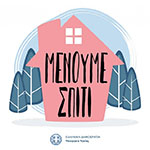Σημαντική επισήμανση για τις χρεώσεις μέσω κινητής τηλεφωνίας
Υπενθυμίζουμε ότι η μηδενική χρέωση μέσω κινητής τηλεφωνίας ισχύει για τις ιστοσελίδες που αναφέρονται στο
(δελτίο τύπου του ΥΠΑΙΘ), όπου περιλαμβάνονται τα Διαδραστικά Σχολικά Βιβλία ( e-books.edu.gr ), η κεντρική πύλη αναζήτησης ΦΩΤΟΔΕΝΤΡΟ ( photodentro.edu.gr ) και όλα τα Αποθετήρια Εκπαιδευτικών Πόρων Φωτόδεντρο ( photodentro.edu.gr/lor , photodentro.edu.gr/video , photodentro.edu.gr/edusoft , photodentro.edu.gr/ugc , photodentro.edu.gr/oep , photodentro.edu.gr/i-create ).
Η προβολή περιεχομένου που φιλοξενείται σε εξωτερικά αποθετήρια ή ιστοσελίδες εκτός των παραπάνω ή το άνοιγμα συνδέσμων που οδηγούν σε εξωτερικό περιεχόμενο δεν υπάγονται στη μηδενική χρέωση.

ΓΛΩΣΣΑΡΙΟ
Όρος |
Ορισμός |
|---|---|
| archaeologist (noun) | someone who studies the buildings, graves, tools and other objects of people who lived in the past, αρχαιολόγος
|
| behead (verb) | to cut off the head of, αποκεφαλίζω
|
| biography (noun) | the written story of the facts and events of a person's life, βιογραφία
|
| collection (noun) | a gathering of a group of things of the same type, συλλογή
|
| cousin (noun) | the son or daughter of an aunt or uncle, ξάδελφος/η
|
| criticism (noun) | the act of judging what is good or bad in something
|
| development (noun) | the act of developing or bringing to a completed state, ανάπτυξη
|
| die (verb) | to stop living; become dead, πεθαίνω
|
| different (adjective) | not the same; not alike, διαφορετικός
|
| dig (verb) | to make a hole by removing dirt, sand, or the like, σκάβω
|
| divorce (verb) | to end your marriage by an official or legal process, παίρνω διαζύγιο
|
| dolphin (noun) | a mammal that lives in the water, δελφίνι
|
| excavate (verb) | to uncover by digging, κάνω ανασκαφή
|
| follow (verb) | to come or go after or behind, ακολουθώ
|
| gap (noun) | a space or blank in something that is otherwise connected or complete, κενό
|
| history (noun) | the written record of things that happened in the past, ιστορία
|
| material (noun) | anything used for building or making something else, υλικό
|
| Minoan (adjective) | relating to the advanced Bronze Age culture that flourished in Crete from about 3000 to 1100 B.C., Μινωικός
|
| note (noun) | a short piece of writing, σημείωμα
|
| owner (noun) | the person that something belongs to, ιδιοκτήτης
|
| palace (noun) | the official home of a king or queen or other persons of high rank or authority, παλάτι
|
| prison (noun) | a building for holding and punishing people who have broken the law, φυλακή
|
| pyramid (noun) | a massive monument of ancient Egypt built over a crypt or tomb, πυραμίδα
|
| recent (adjective) | having to do with or happening in the very near past, πρόσφατος
|
| report (verb) | to tell; state, αναφέρω
|
| role (noun) | the position or purpose that someone or something has in a situation, organization, society or relationship, ρόλος
|
| site (noun) | a place where something is built, or where something happened, χώρος
|
| statue (noun) | a piece of art that is made out of stone, metal, or other material, άγαλμα
|
| step (noun) | an act or stage in a series, βήμα
|
| storeroom (noun) | a storage room for inventory, supplies, or equipment, αποθήκη
|
| survive (verb) | to continue to live despite serious threat to one's life, επιζώ
|
| text (noun) | the written words in a book, magazine, etc., not the pictures, κείμενο
|
| thousand (noun) | the number 1,000, χίλια
|
| understand (verb) | to get the meaning, nature, or importance of, καταλαβαίνω
|
| village (noun) | a small town or community, often in the country, χωριό
|
| wonder (noun) | a thing or event that causes admiration, surprise, or amazement, θαύμα
|
| wonderful (adjective) | causing feelings of wonder; excellent or amazing, υπέροχος
|















